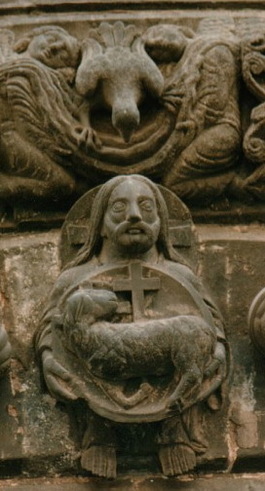
There are quite a few things to be gleaned from this event in Daniel’s life, and God’s deliverance is only one of them. But since it is the most obvious one, let’s look at it first. Why did God deliver Daniel from the mouth of the lions? Our Scripture passage tells us that “no harm was found on him, because he trusted in his God.” Daniel exercised an altogether uncommon level of faith, one that went far beyond “I believe;” for Daniel it was more like, “Because I believe, this is how I will live my life on a daily basis.” Here he was in a foreign country, deprived of temple worship and, as a resident in one of the king’s palaces, he was deprived even of regular contact with his fellow Jews. Yet three times every day he went to his window that faced Jerusalem, where the temple lay in ruins, and “prayed and gave thanks before his God as he had done previously.” Daniel’s devotional life was a habit he never broke despite the injunction of the king against it.
Here we have a blatant example of civil disobedience in the face of an explicit command from the king himself. It reminds us of Peter and his colleagues who, after being freed from prison and being told again that they were not to preach in the name of Jesus, still told the authorities, “We must obey God rather than men.” For Daniel, obedient and faithful worship of his God was not optional. He trusted that God would take care of the king’s command even if it meant surrendering his life to dismemberment at the jaws of the lions. Would we do the same? At the very least we would be more likely to follow Jesus’ injunction to enter our closets when praying, a much safer option than going to the window. Of course the context of Jesus’ words was completely different. But the point is that Daniel’s actions were bold and highly visible, with dire consequences.
The words of the king to Daniel are fascinating. They went far beyond a mere acknowledgement of the king’s fondness for Daniel as his faithful servant. He said, “May your God, Whom you serve continually, deliver you!” Even before God actually did deliver Daniel, the king was profoundly affected by Daniel’s witness and Daniel’s testimony to the depth and constancy of his faith. Daniel’s worship of God was not something that he picked up and set down at periodic intervals according to a loose adherence to his Jewish faith. It was something that he practiced not fewer than 3 times daily, accompanied by giving thanks and seeking mercy, two of the most important elements in prayer.
You know what happened next. But what’s most important is what the King said after staying up all night fasting and then, in the morning, hurrying to the lions’ den. He calls out, “O Daniel, servant of the living God, has your God Whom you faithfully serve been able to deliver you from the lions?” Daniel of course gives God the glory, saying that God sent His angels to shut the mouths of the lions. And then the King makes this amazing statement that we would never expect to hear from the mouth of an unbeliever even in the face of this miracle. He issues a decree in the languages of all the people living in his kingdom, telling everyone to tremble and fear before Daniel’s God:
“For He is the living God,
enduring forever.
His kingdom shall never be destroyed,
and His dominion has no end.
He delivers and rescues,
He works signs and wonders in heaven and on earth;
for He has saved Daniel
from the power of the lions.”
This is not a bad witness to the Almighty God from the lips of a foreign monarch who only has peered in from the outside. Refusing to consider any explanation other than the miraculous, he changes his injunction from “worship me” to “tremble and fear before the living God.”
Just imagine being in Daniel’s shoes! He rose from being a young Jewish captive to procuring the favor of the kings of the Medes and Persians and becoming number one among the presidents in the kingdom simply because he was faultlessly faithful in his service both to his heavenly King and to his earthly monarch. He faithfully worshiped God with thanksgiving and pleas for mercy, and he experienced God’s miraculous deliverance in the face of a certain and gruesome death, a fate that soon was meted out instead to Daniel’s accusers.
Fast forward to the early Christian era. The great prophet John the Baptist gets his head cut off; the first deacon Stephen gets stoned to death; Peter and Paul and their companions are imprisoned, beaten, and ultimately executed; literally thousands of Christians are shredded in coliseums by lions for the entertainment of scoffing and cheering unbelievers. What happened to the God who could rescue Daniel from the lions and protect the three young men from the fiery furnace?
Some of you have sung various settings of the wonderful spiritual, “Didn’t My Lord Deliver Daniel.” Its text goes like this:
He delivered Daniel from the lion's den
And Jonah from the belly of the whale
And the Hebrew children from the fiery furnace
An’a why not’a every man?
Didn't my Lord deliver Daniel?
Deliver Daniel, deliver Daniel?
Didn't my Lord deliver Daniel?
An’a why not’a every man?
We sang this in Chicago Master Singers (CMS) and on tour, and we also took it on tour with my First Presbyterian Church of Lake Forest choir. While we were in Europe, a woman in the church choir took me aside in bitter tears to tell me why she could not sing that song any more. She was a black woman from the South who had escaped her oppressive surroundings with a beloved relative after the murder of her father. Her father had taken the bus on a route he had taken many times before; but, for some reason, he accidentally got off at the wrong stop and ended up in an all-white neighborhood where he did not belong. He was captured and brutally beaten to death. And so, through those bitter and angry tears, this woman in my choir quoted the words, “Didn’t my Lord deliver Daniel, an’a why not’a every man?”
Why not her father? Why not John the Baptist? Why not Stephen? Why not Peter and Paul and the other early Christian martyrs? Why not some of our own loved ones who knew, loved and served our God as faithfully as Daniel? These are questions that have been asked again and again across the centuries. They are questions for which we have no answers that will satisfy everyone who asks. Sometimes it seems to be a matter of God testing us to see whether we will repudiate our faith or grow stronger in it. Both responses have been seen and recorded over and over. But does God permit agonizing deaths for some simply as tests for others? Are some persons more deserving of deliverance than others? Are some people simply foreordained to suffer unspeakable torture in this life?
Most of you know the tragic story of the Gabel family. CMS tenor Gary Gabel and his wife, Betty, raised their son John in the faith of Jesus Christ. John married a radiant Christian woman and together they responded to the call of God to be His witnesses in Afghanistan despite the incredible dangers of proclaiming Christ covertly in a country where missionary activity was illegal and punishable by death. Gary and his wife Betty decided to go to Afghanistan to visit their son, John; their daughter-in-law, Theresa; and their grandchild on her first birthday. As they were about to enter the hospital where Theresa worked, a security guard opened fire and in an instant killed both Gary and John. “Didn’t my Lord deliver Daniel, an’a why not’a every man?”
Our faith is filled with “why’s” and “why not’s” for which we are not given answers. John, the Beloved disciple, simply died of old age in exile on Patmos. Yet two of John’s followers, Ignatius and Polycarp, actually welcomed martyrdom, seeing it as a way to complete their identification with their Lord and Savior. Polycarp’s martyrdom is said to have brought many more persons to faith than his life and teaching. Yet others, when faced with the waves of persecution under various Roman emperors, simply recanted or even repudiated their faith.
What is our answer and our takeaway from these stories?
1) First, we must let God be God, without demanding answers that God does not provide. “Why do the righteous suffer” is very high on the FAQ list of all humankind. I suspect that one could fill every library in metropolitan Chicago with the books that have been written on this subject. Curiously, Gary Gabel himself gave me one such book as a gift a few years before his death because he was moved by the story of my daughter’s death. He personally inscribed the book. Who could have known? We must let God be God.
2) Second, we observe that the Psalms are replete with askings of our question both ways: why do the righteous suffer, and why do the wicked prosper? And every time the same answer comes back: God’s ultimate judgment is certain. It may be “deferred justice” and sometimes we may not even live to see it carried out. But God is on His throne. His righteousness demands His justice. Without God’s justice we could not know His mercy. The psalmists are reminding us that our perspective is severely limited by our finiteness. We cannot see as God sees. But His justice will prevail. That’s the entire point of the Book of Revelation in a nutshell: the righteous will enjoy unspeakable bliss and the wicked will suffer eternal punishment. Our job absolutely is NOT to second-guess God or to make our obedience contingent on our understanding of precisely how and why God acts, or within what timeframe He acts, or whether His actions always conform immediately to our own sense of how justice should be executed.
Daniel is an amazing model for us on so many levels. Of course first and foremost was his faithfulness to God. But he also models for us faithfulness to those whom we serve in this life, as this is our responsibility not only to them but before God Himself. Our job is to follow Daniel’s example of faithful obedience.
Daniel also models faithfulness in his life of devotional worship. His was not a once-a-week practice of his faith, nor was it even a once-a-day faith. At a very minimum, he worshiped God actively three times a day. I’m willing to bet that his prayer life extended well beyond those 3 times of formal devotion. I don’t doubt that anyone who does morning, noonday and evening prayer on a daily basis also communes with God at many other times of day. Paul admonished us to “pray without ceasing,” and God told Joshua, “This book of the law shall not depart out of your mouth; you shall meditate on it day and night, so that you may be careful to act in accordance with all that is written in it. For then you shall make your way prosperous, and then you shall be successful.” Could that be our formula for realizing God’s promises more fully? Not many of us have given it a try in terms of total immersion in God’s Word and in prayer. Our life-styles do not allow it, yet every one of us could do much better.
Finally, while we are not allowed to get closer to Daniel’s prayer life, we are told what may be the two most important things imaginable about it: it was characterized by giving God thanks and by pleading for God’s mercy. We know there are other important elements in prayer, starting with praising and honoring God, continuing with making intercession for others and including making our requests known to Him. All of these things are embodied in the Lord’s Prayer itself. But if our prayers are grounded in giving God thanks and in pleading for His mercy, we are off to a great start in knowing Him and committing ourselves to doing His will, faithfully and frequently. Then, whether literally or figuratively, we will know what it is to experience God’s deliverance. “Didn’t my Lord deliver Daniel, an’a why not’a every man?”
In the Name of the Father and of the Son and of the Holy Spirit, Amen




 RSS Feed
RSS Feed


